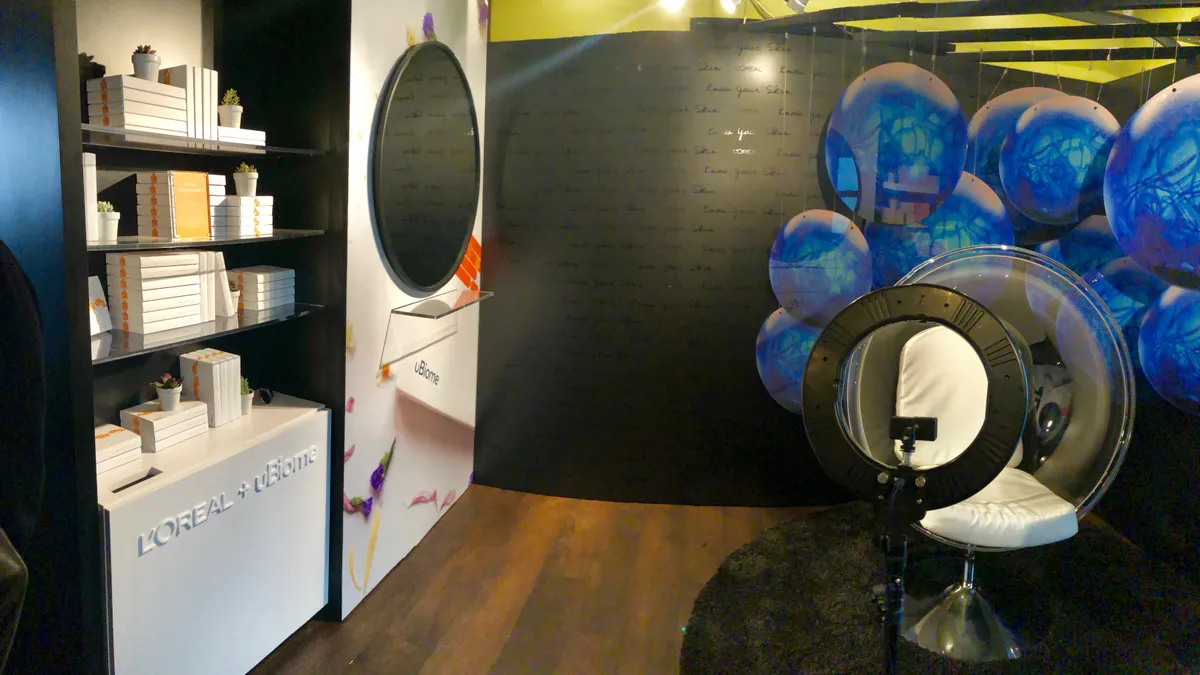AUSTIN, TEXAS — As the demand for personalized marketing and products continues to blossom, L'Oréal announced a partnership with microbial genomics company uBiome this week at the South by Southwest conference.
The partnership from the beauty giant's technology incubator lets consumers submit cheek-swab samples — similar to buzzy genomics biotech company 23andMe — which uBiome analyzes to determine a user's skin health based on the ecosystem of microbes of bacteria, viruses, fungi and other microorganisms that live on the skin and can cause acne, eczema and skin irritations when it is imbalanced. Based on the results, a user can make more personalized product choices.
"When it comes to skincare, people often audition product after product to determine what works for their unique skin," said Guive Balooch, VP of L'Oréal's Technology Incubator, during a panel session on Monday. "Our goal is to advance scientific research and leverage new technologies to change this relationship by allowing deeper levels of personalization."
Foundation as a beauty-tech foundation
Reflecting on past iterations of beauty-related tech and skin analysis features, Balooch mentioned the company's first personalized tool around custom foundation shades, which Balooch said addressed research showing 50% of women previously couldn't find the right shade to match their skin tone. But identifying the correct shade wasn't enough.
"If we do all of this and we can't provide a tailor-made solution, then it doesn't really bring the full experience together," Balooch said. "The approach that we first started was, 'it should be like the Home Depot paint. You just go there, you give the color you want and then you get the paint personalized.' But our skin isn't like a wall. Our skin is a biological tissue, so we have so many different skin tones and people react differently to different products."
During the panel, titled "The Future of Connected Beauty," Balooch emphasized the intersection between wellness, beauty and technology, highlighting wearable tech's ability to deliver actionable insights into a person's health and serve up personalized product recommendations that inform a shopper's decision-making process at the store.
"I think that convergence of technology is where everything is going," Balooch said. "If you can create technology to give people information about what they can use, you can solve these kinds of challenges in terms of confidence in everyone's beauty routine."
Not the first rodeo
The uBiome partnership is not L'Oréal's first foray into science-based technology. In November, the beauty giant started selling a button-sized sensor at Apple Stores to help people track their exposure to skin-damaging ultraviolent (UV) radiation. The My Skin Track UV sensor, offered by L'Oréal's skincare brand La Roche-Posay, doesn't require batteries and has a companion app that gives iPhone users personalized tips on keeping UV exposure at a healthy level. The low-cost UV sensor demonstrates how mobile tech can support innovations that help people lead healthier lives while removing a friction point for wearers like charging the hardware.
"You just wear it on your body, and you can clip it and then use it in different accessories, and it gives you the level of UV exposure that you have over a period of time and then gives you actionable information," Balooch said. "Melanoma has been on the rise for 45 years. There is something we need to do about this. So there is a real call for action and there is a strong link to a product usage but also lifestyle usage."
Hardware has been a priority for L'Oréal since the company launched its Technology Incubator in 2012. Balooch began work on the UV tracker two years ago in collaboration with Northwestern University. At the Consumer Electronics Show in January, L'Oréal's La Roche-Posay brand introduced a test version of a wearable device that helps people track the pH levels of their skin as part of their skincare regimen, connected through a mobile app, to collect data on skin inflammation, eczema and atopic dermatitis. The device and app then make customized product recommendations based on an individual user's results.
"Our goal is to advance scientific research and leverage new technologies to change this relationship by allowing deeper levels of personalization."

Guive Balooch
VP of L'Oréal's Technology Incubator
Mobile technology in the broader beauty space is growing increasingly important for both traditional brands and direct-to-consumer startups. At SXSW, there's more exhibit space dedicated to beauty brands seeking to reach the 47% of the conference's estimated 70,000 female attendees, Glossy reported. Augmented reality (AR) beauty developer Perfect Corp. introduced a virtual beauty adviser experience earlier in March for its YouCam Makeup app, while several skincare brands have integrated mobile tech with their product recommendations in the past year, including Olay's Skin Advisor features launched at the Consumer Electronics show in January.
In developing new technology that serves customers unique insights, beauty recommendations and products, Balooch highlighted the importance of using artificial intelligence, mobile technology and product personalization tools to develop unique regimens for users, spark longer lifetime value of loyal customers and leverage technology in ways that humans simply can't.
"It's a market that you have to create value in the right way, meaning that you have to really make sure you're making this kind of product that you would never be able to get if you didn't have that kind of machine or that kind of system," Balooch said.





















